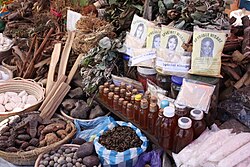
Back ባሕላዊ መድኃኒት Amharic طب تقليدي Arabic লোকচিকিৎসা Assamese Medicina tradicional AST Xalq təbabəti Azerbaijani Народная медыцына Byelorussian Традиционна медицина Bulgarian ঐতিহ্যবাহী চিকিৎসাবিজ্ঞান Bengali/Bangla Tradicijska medicina BS Medicina tradicional Catalan


| Part of a series on |
| Alternative medicine |
|---|
 |
Traditional medicine (also known as indigenous medicine or folk medicine) comprises medical aspects of traditional knowledge that developed over generations within the folk beliefs of various societies, including indigenous peoples, before the era of modern medicine. The World Health Organization (WHO) defines traditional medicine as "the sum total of the knowledge, skills, and practices based on the theories, beliefs, and experiences indigenous to different cultures, whether explicable or not, used in the maintenance of health as well as in the prevention, diagnosis, improvement and treatment of physical and mental illness".[1] Traditional medicine is often contrasted with Evidence based medicine.
In some Asian and African countries, up to 80% of the population relies on traditional medicine for their primary health care needs. Traditional medicine is a form of alternative medicine. Practices known as traditional medicines include traditional European medicine[citation needed], traditional Chinese medicine, traditional Korean medicine, traditional African medicine, Ayurveda, Siddha medicine, Unani, ancient Iranian medicine, traditional Iranian medicine, medieval Islamic medicine, Muti, Ifá and Rongoā. Scientific disciplines that study traditional medicine include herbalism, ethnomedicine, ethnobotany, and medical anthropology.
The WHO notes, however, that "inappropriate use of traditional medicines or practices can have negative or dangerous effects" and that "further research is needed to ascertain the efficacy and safety" of such practices and medicinal plants used by traditional medicine systems.[1] Its "Traditional Medicine Strategy 2014–2023" said that the WHO would "support Member States in developing proactive policies and implementing action plans that will strengthen the role traditional medicine plays in keeping populations healthy."[2]
- ^ a b "Traditional Medicine: Definitions". World Health Organization. 2008-12-01. Retrieved 2014-04-20.
- ^ "WHO traditional medicine strategy: 2014-2023". The World Health Organization. December 2013. Archived from the original on January 13, 2014.